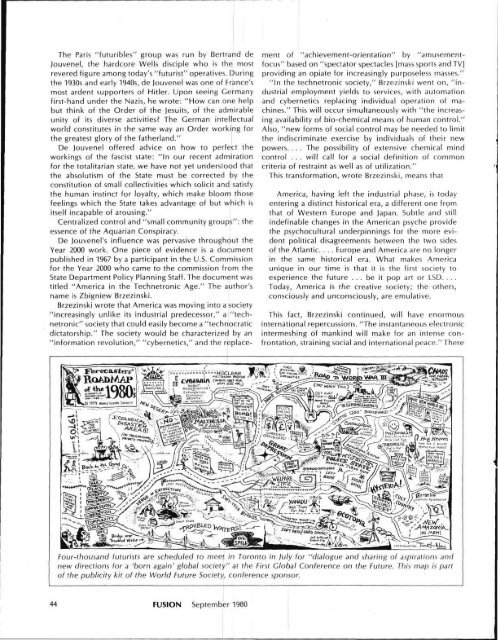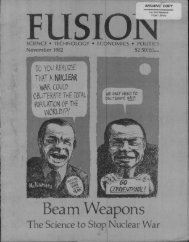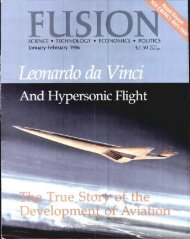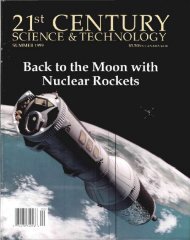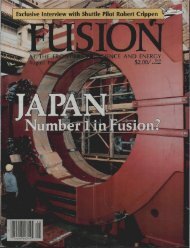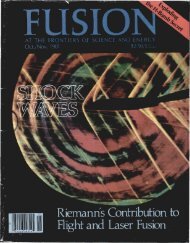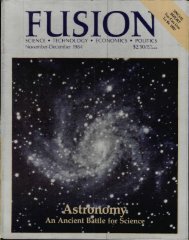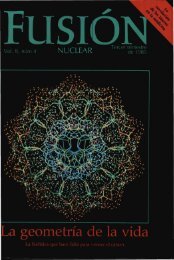Europe, Bertrand de Jouvenel, himself a student anddisciple of H.G. Wells. Wells was a ferocious opponent ofthe American industrial republican form of government.He believed that science should be the preserve of achosen elite, and not a subject of concern to the "sheeplikemasses." His writings on "The Open Conspiracy" and"The World Brain" outline his belief that nations shouldbe governed by a supranational dictatorship. Wells envisionedthe era of mass communications as ushering inunparalleled potentialities for social control; the "War ofthe Worlds" radio experiment in 1938 was one publicexample. Wide-scale drug consumption (The Island of Dr.Moreau) and top-down manipulation of social planning("futurism," as sketched in Wells's 1910 The Discovery ofthe Future) are the instrumentalitiesWells identifies.Wells's promulgation of an"open conspiracy" is cited byMarilyn Ferguson in herbook The Aquarian Conspiracy(1980) as the earliest 20thcenturystatement of theaims of the hard-core counterculture.Wells was no isolated futurist.His conceptions, devisedin collaboration withthe British Secret IntelligenceService, guided the psychologicalwarfare conductedduring World War II by theOffice of Strategic Services'Strategic Bombing Surveyand the Committee on NationalMorale.The postwar period sawthe emergence of a complexof institutions assigned to conduct mass psychologicalprofiling and manipulation and confinement of the U.S.technological boom: these included the Rand Corporation,the Palo Alto Center for Advanced Behavioral Sciences,the University of Michigan's Institute for SocialResearch, the National Training Laboratories, and theNational Institute of Mental Health.Such think tanks served as a sort of priesthood for acorporate group that was already in a position to beginshaping the U.S. economy along Wellsian lines—pursuingneither industrial expansion nor financial profits, but actingas NATO's lever in the sphere of American businessstrategy. The directorates of Rank-Xerox, IBM, StandardTelephone and Cables, AT&T, Prudential Insurance, andITT are among the most important executives accountablefor the decoupling of high technology from mass-scalescientific capabilities in the population of the UnitedStates.These were the NATO resources thrown against thespace program's potential in the early 1960s.The most public "information society" salvo of the 1960scame out of California at the same time the drug culturewas created there by think tanks in Palo Alto, Menlo Park,and San Francisco-Berkeley. The Center for the Study ofDemocratic Institutions, drawing on Aspen Institute perspectives,initiated the 1962 Ad Hoc Committee on theTriple Revolution. The report from their Michigan meetingconcluded that human labor was being replaced by "acombination of the computer and the automated selfregulatingmachine," heralding "the postscarcity era" ofcybernation. Man must now find "a new purpose," thereport asserted, since the "traditional link between jobsand income" is about to be broken.The Santa Barbara sponsors of this initiative were formerUniversity of Chicago president Robert Maynard Hutchins,proponent of a supranationalbucolic elite and one of themost vocal post-World WarII opponents of the developmentof nuclear power asan <strong>energy</strong> resource, and hisprotege W.H. Farey, vicepresident of the Fund for theRepublic.Objectively,theTriple Revolutionoutlook was preposterous:by any measure of theneed to upgrade the worldeconomy and world laborskills, exponential growth inU.S., European, and Japaneseindustrial capacity was urgentlyrequired.Yet the myth of an overfed,supernumerary work forcebecame a media formula andan academic truism, creatingamong other things the "NewLeft." Endorsers of the Triple Revolution perspective includedTom Hayden, a founder of the Students for a DemocraticSociety (SDS). SDS appealed to both jaded suburbanyouth and would-be intellectuals, with the pitch that a"postindustrial America" ought to find "new values."The publicist of the cybernation concept, Donald Michael,had just completed one of the major profilingstudies on the U.S. space program. Michael is currently inSan Francisco collaborating with Stanford Research Institute'sWillis Harman on an array of projects including thepromulgation of a concept of "appropriate science,"which, like its stepmother "appropriate technologies,"puts limits on the realm of scientific investigation and thefreedom allowed researchers.How far these concepts had become hegemonic wasevident in a series of three simultaneous "Year 2000"projects launched in 1966-1967: one by a group in Francecalled the "Futuribles," a second by the Tavistock-linkedScience Policy Research Unit in Sussex, England, titled"Mankind 2000," and the third by the U.S. Academy ofArts and Sciences, titled "The U.S. in the Year 2000."September 1980 FUSION 43
The Paris "futuribles" group was run by Bertrand deJouvenel, the hardcore Wells disciple who is the mostrevered figure among today's "futurist" operatives. Duringthe 1930s and early 1940s, de Jouvenel was one of France'smost ardent supporters of Hitler. Upon seeing Germanyfirst-hand under the Nazis, he wrote: "How can one helpbut think of the Order of the Jesuits, of the admirableunity of its diverse activities? The German intellectualworld constitutes in the same way an Order working forthe greatest glory of the fatherland."De Jouvenel offered advice on how to perfect theworkings of the fascist state: "In our recent admirationfor the totalitarian state, we have not yet understood thatthe absolutism of the State must be corrected |jy theconstitution of small collectivities which solicit and satisfythe human instinct for loyalty, which make bloom thosefeelings which the State takes advantage of but which isitself incapable of arousing."Centralized control and "small community groups": theessence of the Aquarian Conspiracy.De Jouvenel's influence was pervasive throughout theYear 2000 work. One piece of evidence is a documentpublished in 1967 by a participant in the U.S. Commissionfor the Year 2000 who came to the commission from theState Department Policy Planning Staff. The document wastitled "America in the Technetronic Age." The author'sname is Zbigniew Brzezinski.Brzezinski wrote that America was moving into a society"increasingly unlike its industrial predecessor," a "technetronic"society that could easily become a "technocraticdictatorship." The society would be characterized by an"information revolution," "cybernetics," and the replacementof "achievement-orientation" by "amusementfocus"based on "spectator spectacles [mass sports and TV]providing an opiate for increasingly purposeless masses.""In the technetronic society," Brzezinski went on, "industrialemployment yields to services, with automationand cybernetics replacing individual operation of machines."This will occur simultaneously with "the increasingavailability of bio-chemical means of human control."Also, "new forms of social control may be needed to limitthe indiscriminate exercise by individuals of their newpowers. . . . The possibility of extensive chemical mindcontrol . . . will call for a social definition of commoncriteria of restraint as well as of utilization."This transformation, wrote Brzezinski, means thatAmerica, having left the industrial phase, is todayentering a distinct historical era, a different one fromthat of Western Europe and Japan. Subtle and stillindefinable changes in the American psyche providethe psychocultural underpinnings for the more evidentpolitical disagreements between the two sidesof the Atlantic. . . . Europe and America are no longerin the same historical era. What makes Americaunique in our time is that it is the first society toexperience the future ... be it pop art or LSD. . . .Today, America is the creative society; the others,consciously and unconsciously, are emulative.This fact, Brzezinski continued, will have enormousinternational repercussions. "The instantaneous electronicintermeshing of mankind will make for an intense confrontation,straining social and international peace." ThereFour-thousand futurists are scheduled to meet in Toronto in July for "dialogue and sharing of aspirations andnew directions for a 'born again' global society" at the First Global Conference on the Future. This map is partof the publicity kit of the World Future Society, conference sponsor.44 FUSION September 1980
- Page 2 and 3: FUSIONMAGAZINE OF THE FUSION ENERGY
- Page 4 and 5: of the Academy drew an editorial bl
- Page 6 and 7: LettersRiemann Vs. Darwin:Evolution
- Page 8 and 9: LettersContinued from page 7The Aut
- Page 10 and 11: News BriefsCarlos de HoyosUwe Parpa
- Page 12 and 13: News BriefsU.S. BUDGET CUTS TARGET
- Page 14 and 15: Special ReportWhy MonetarismDestroy
- Page 16 and 17: according to Mitchell, the seminal
- Page 18 and 19: the worst accident that could possi
- Page 20 and 21: subways), fossil-fueled power plant
- Page 22 and 23: should be started now, Levitt state
- Page 24 and 25: TheNASAStoryThe Fight forAmerica'sb
- Page 26: To one leading military faction at
- Page 29 and 30: created since the midcentury, in at
- Page 31 and 32: created the rockets and all the ins
- Page 33: While the military and the presiden
- Page 36 and 37: James E. Webb (right), the NASA adm
- Page 38 and 39: NASAAnatoly Dobrynin (foreground),
- Page 40 and 41: TheNATOPlan to KillUS. Scienceby Ma
- Page 44 and 45: could well be a "three-way split; i
- Page 46 and 47: mation of a U.S. Association for th
- Page 48 and 49: continued development of high-power
- Page 50 and 51: intense beam of laser light, ions,
- Page 52 and 53: toward the generation of "hot" elec
- Page 54 and 55: system that combined the KrF with a
- Page 56 and 57: Others have charged that scientists
- Page 58 and 59: AAAS-Brookings Conf.:Nonscience Age
- Page 60 and 61: Siberian development is at thecente
- Page 62 and 63: tition from the antinuclear Union o
- Page 64 and 65: as the primary driver to implode th
- Page 66 and 67: A CDC spokesman said that thenew sy
- Page 68 and 69: Space Science& TechnologyThe Solar
- Page 70 and 71: hoto by C. Srinivasen/United Nation
- Page 72 and 73: 1975. This index has been at or bel
- Page 74 and 75: course, the primary cooling systemi
- Page 76 and 77: _The Young Scientist.What IsEnergy?
- Page 78 and 79: Lyndon LaRoucke, Democrat for Presi


